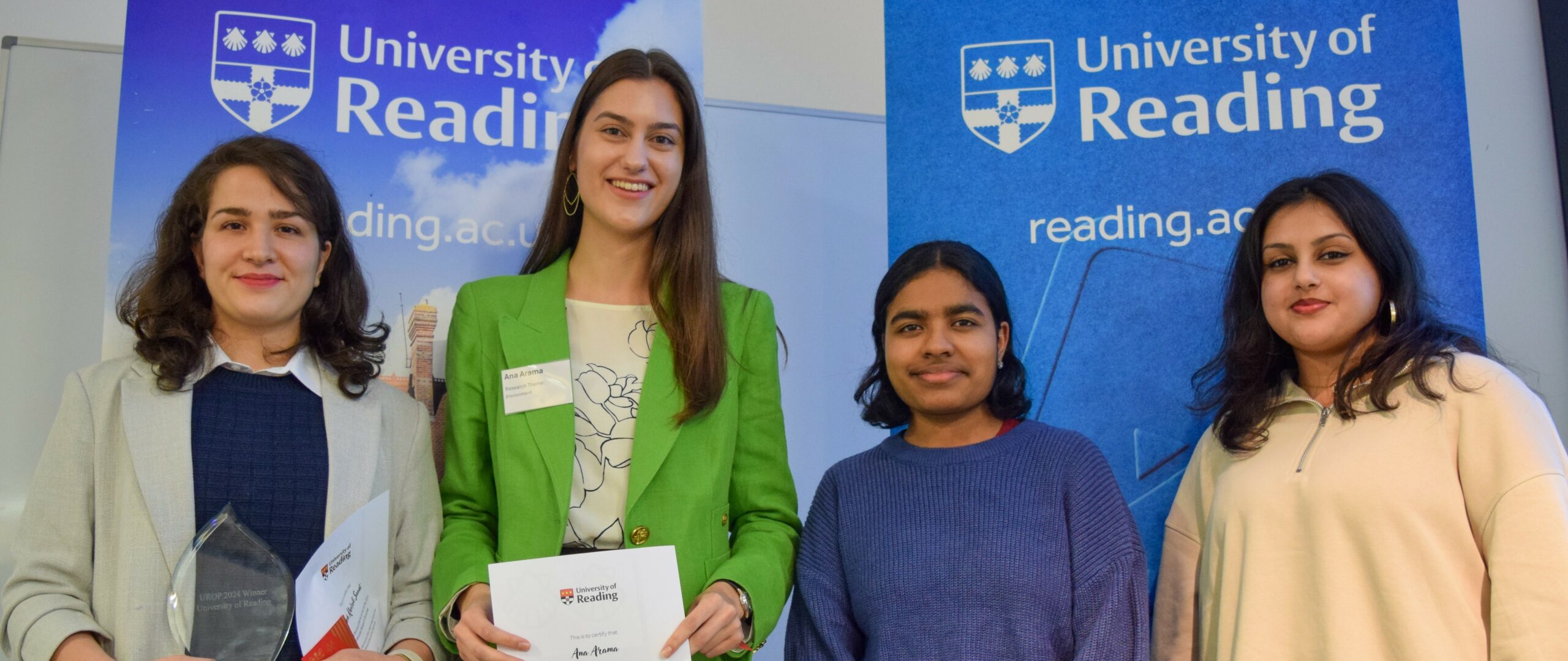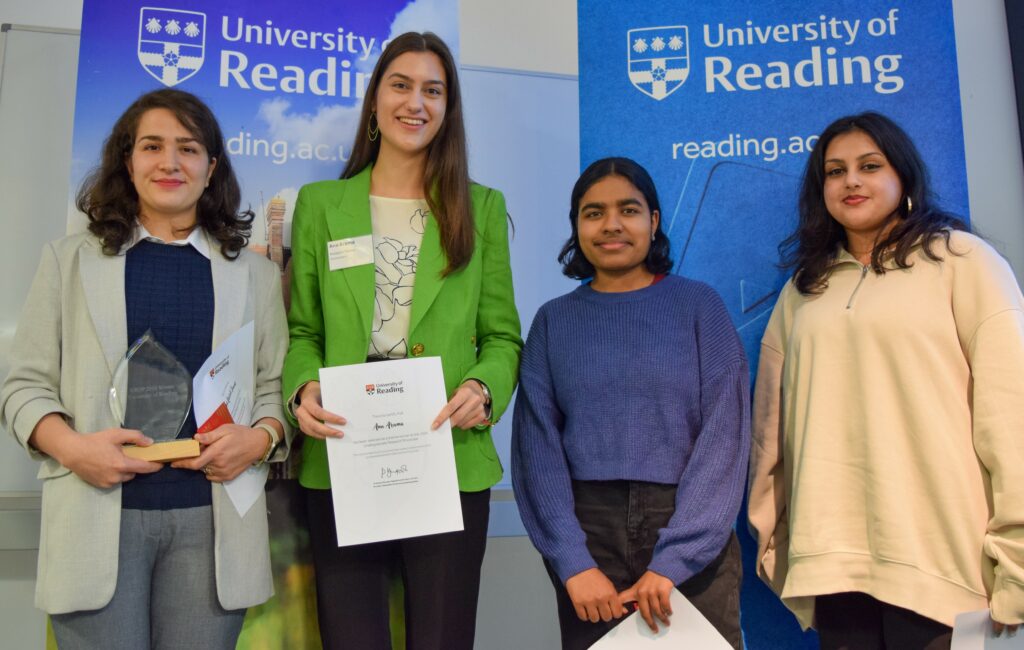
In November 2024, the Undergraduate Research Opportunities Programme (UROP) held its final showcase event before it becomes part of the Reading Internship Scheme in 2025.
The programme has provided students at the University of Reading with the chance to gain hands-on research experience across all disciplines. Participants produced an academic poster summarising the findings of their research project, which they then presented at the showcase event where winners were announced for each research theme.
In this blog, the winners reflect on their research projects and how their experiences in the programme have benefitted them.
Agriculture, Food and Health: Farideh Kheirati Saadi
Developing biological activity and toxicological assays using invertebrates
(supervisor: Professor Vitaliy Khutoryanskiy)
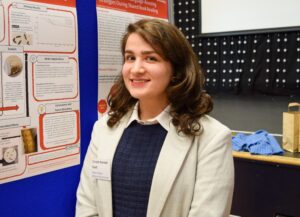 This project explored how a tiny larvae could have a big impact on pharmaceutical testing. In the search for ethical and cost-effective alternatives to animal models, Galleria mellonella stands out as a promising choice. The larvae is of a manageable size with an immune system similar to that of mammals, and it does not require special licensing to test on.
This project explored how a tiny larvae could have a big impact on pharmaceutical testing. In the search for ethical and cost-effective alternatives to animal models, Galleria mellonella stands out as a promising choice. The larvae is of a manageable size with an immune system similar to that of mammals, and it does not require special licensing to test on.
For the study, researchers tested toxicity and antimicrobial effects by injecting the larvae with compounds and recorded the results. It was found that Galleria mellonella can reveal insights into antimicrobial resistance and toxicity and help to reduce reliance on traditional mammalian models. This could make drug discovery faster, cheaper and more ethical.
“Participating in UROP has been a truly transformative experience for me. It provided an invaluable opportunity to step beyond the classroom and engage in hands-on research, where I could apply and expand my knowledge in a meaningful way. My project allowed me to explore innovative techniques and overcome unique challenges, such as identifying suitable controls and optimising methodologies.
Through the programme, I gained practical research skills, critical thinking abilities and confidence in presenting my findings to an audience of academics and professionals. Winning the UROP award has been a significant milestone in my academic journey and has inspired me to continue pursuing research in pharmacy. Overall, this experience has reaffirmed my passion for research and its potential to make a meaningful impact on the pharmaceutical sciences.”
Environment: Ana Arama
Effect of climate change on tropical precipitation uncertainty
(supervisor: Dr Paul-Arthur Monerie)
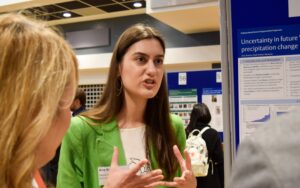 The rainfall from the West African Monsoon (WAM) has a significant impact on available water resources, agriculture and health in the region, with many people’s livelihoods depending on it. Due to the monsoon’s importance, scientists use climate models to predict how WAM rainfall might change in the future. Climate models have biases and give a range of projections, and it is important to understand uncertainty in projections. The aim of this investigation was to understand the uncertainty in future WAM precipitation change by comparing projections from 39 coupled climate models.
The rainfall from the West African Monsoon (WAM) has a significant impact on available water resources, agriculture and health in the region, with many people’s livelihoods depending on it. Due to the monsoon’s importance, scientists use climate models to predict how WAM rainfall might change in the future. Climate models have biases and give a range of projections, and it is important to understand uncertainty in projections. The aim of this investigation was to understand the uncertainty in future WAM precipitation change by comparing projections from 39 coupled climate models.
The study found that uncertainty in future precipitation change could be partly due to model differences. It also concluded that having more model components in common creates more similar results, meaning that model interdependencies do exist, and that having an atmosphere or land model in common makes the results more similar than if the ice or ocean model is in common.
“UROP was a great opportunity to gain valuable research experience related to my degree. During the project, I worked with data from climate models, which enhanced my understanding of climate model uncertainties and allowed me to develop my coding skills for data and statistical analysis. I also enjoyed the challenge of presenting my findings to a non-specialist audience – an essential skill for effectively communicating climate change research. Furthermore, I valued working with a supervisor who was so passionate about their work and was willing to share their knowledge with me. Overall, completing the project gave me insight into what a research career might entail, solidified my passion for research and gave me the skills and confidence to help me achieve my goal of pursuing a PhD after graduation.”
Heritage & Creativity: Gayatri Ramakrishnan
The cat’s whiskers: Understanding wildcat diets and how they have changed over the last 120 years (supervisor: Dr Stuart Black)
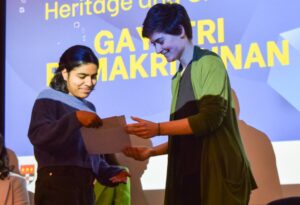 Scottish wildcats Felis silvestris are the last remaining native feline species in the UK. Sadly, their numbers have declined due to hybridisation with domestic cats since the late 1950s, habitat loss, disease transmission from domestic cats and climate change. Wildcats are now classified as Critically Endangered in the UK. This project aimed to investigate how wildcat diets have changed over the century in response to changes in prey populations and other major events to help with their conservation strategies.
Scottish wildcats Felis silvestris are the last remaining native feline species in the UK. Sadly, their numbers have declined due to hybridisation with domestic cats since the late 1950s, habitat loss, disease transmission from domestic cats and climate change. Wildcats are now classified as Critically Endangered in the UK. This project aimed to investigate how wildcat diets have changed over the century in response to changes in prey populations and other major events to help with their conservation strategies.
In ecology, a widely used method to determine the diet of an animal is to analyse its tissues for stable isotopes of carbon and nitrogen which are naturally occurring and act as a chemical fingerprint for diet. Here, researchers used individual whiskers of Scottish wildcats obtained from the National Museums of Scotland collection to understand diet patterns across the 20th century. As a carnivorous predator, a wildcat’s diet consists largely of rabbits, but they also prey on rodents and various wild birds. They found that Scottish wildcats diets varied over the 20th Century, with changes to their diets coinciding with World Wars (when rabbits were hunted more for human food) and after the myxomatosis outbreak in mid-1950s where rabbits became scarce. The change in rabbit population has clearly influenced wildcat diets and resulted in wildcats moving closer to human populations, resulting in more hybrid populations.
“This project gave me the opportunity to explore my interests in a new area outside my course. I was fascinated to learn about the wider applications of laboratory techniques and how these findings inform conservation practices. Working with my supervisors on a project that has real life implications and learning from them was the best part! Additionally, I developed laboratory, data analysis, and visualisation skills. My experience has further motivated me to explore postgraduate study.”
Prosperity & Resilience: Anika Singh
Dementia and Human performance in the Travelling Salesperson Problem (supervisor: Dr Markos Kyritsis)
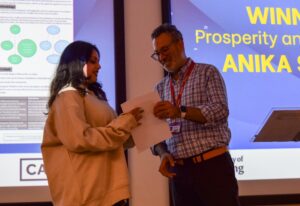 The Travelling Salesperson Problem (TSP) is a behavioural test with promising potential for diagnosing and monitoring dementia by assessing cognitive performance. Unlike traditional assessments, the TSP test is quick, easy and unbiased by educational background or external factors. By comparing an individual’s performance against an ‘optimum’ baseline, healthcare professionals could evaluate cognitive capabilities, gaining insights into a person’s ability to manage day-to-day activities.
The Travelling Salesperson Problem (TSP) is a behavioural test with promising potential for diagnosing and monitoring dementia by assessing cognitive performance. Unlike traditional assessments, the TSP test is quick, easy and unbiased by educational background or external factors. By comparing an individual’s performance against an ‘optimum’ baseline, healthcare professionals could evaluate cognitive capabilities, gaining insights into a person’s ability to manage day-to-day activities.
To assess the effectiveness of the TSP to measure cognitive decline, researchers created a survey for participants to complete and recorded a series of specific variables of interest for each test. Statistic comparisons were made between the performance within the different variants of the TSP with other executive function tests. From this initial research there was some evidence that the TSP could be used diagnostically for dementia.
“This project enhanced my skills in cognitive assessments, ethical participant communication and data analysis. Although I come from a science background, I was able to explore research in a new way by using multiple pieces of software I have never used and probably would never have used if I didn’t participate. For this reason, the UROP did seem daunting at first. However, I was intrigued by the project and so I decided to apply. This was one of the best academic decisions I have ever made, not only in terms of the actual project but also the skills I learned and the opportunity for self-development. The programme boosted my curiosity, gave me confidence and most importantly allowed me to take the extra step. I was able to understand the real-world implications of research. I would definitely recommend the experience – ultimately it allowed me to gain skills that I would have never gained with my degree alone.”
British Museum Partnership
As part of UROP, two undergraduate archaeology students were involved in cataloguing and photographing key assemblages from iconic prehistoric sites across Europe, held within the British Museum’s Archaeological Research Collection. The project ensured that vital cataloguing work was completed, whilst at the same time allowing our students to gain valuable museums and collections management experience.
Reading Internship Scheme
UROP is now part of the Reading Internship Scheme (RIS). The scheme offers a wide variety of internships across a multitude of sectors, including research internships on campus or with external organisations. It allows students to earn a wage while gaining valuable research experience, in either an academic or non-academic setting.
RIS is open to all undergraduates (except foundation year) and all internships pay at least the National Living Wage. Internships run flexibly throughout the year – both part-time during the semester and full-time during the summer vacation.

